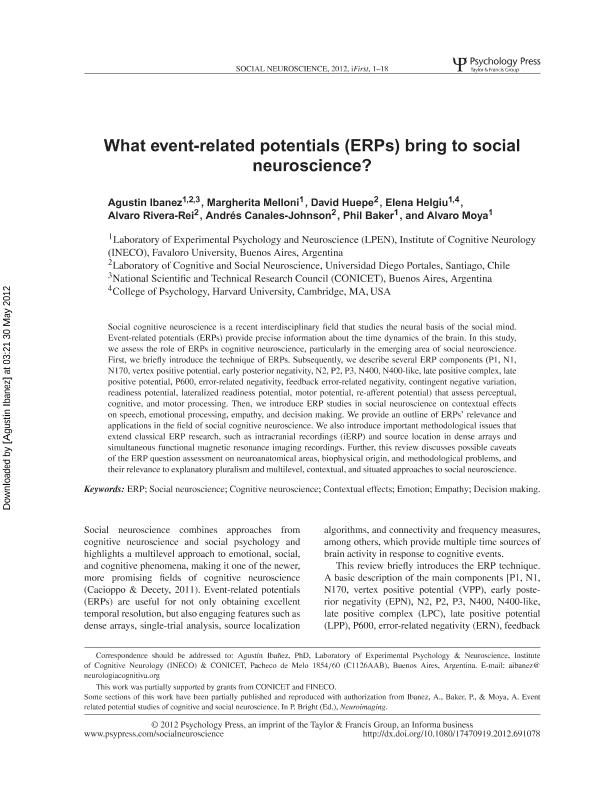Artículo
What event-related potentials (ERPs) bring to social neuroscience?
Ibañez, Agustin Mariano ; Melloni, Margherita
; Melloni, Margherita ; Huepe, David; Helgiu, Elena; Rivera Rei, Alvaro; Canales Johnson, Andrés; Baker, Phil; Moya, Alvaro
; Huepe, David; Helgiu, Elena; Rivera Rei, Alvaro; Canales Johnson, Andrés; Baker, Phil; Moya, Alvaro
 ; Melloni, Margherita
; Melloni, Margherita ; Huepe, David; Helgiu, Elena; Rivera Rei, Alvaro; Canales Johnson, Andrés; Baker, Phil; Moya, Alvaro
; Huepe, David; Helgiu, Elena; Rivera Rei, Alvaro; Canales Johnson, Andrés; Baker, Phil; Moya, Alvaro
Fecha de publicación:
07/2012
Editorial:
Psychology Press
Revista:
Social Neuroscience
ISSN:
1747-0919
Idioma:
Inglés
Tipo de recurso:
Artículo publicado
Clasificación temática:
Resumen
Social cognitive neuroscience is a recent interdisciplinary field that studies the neural basis of the social mind. Event-related potentials (ERPs) provide precise information about the time dynamics of the brain. In this study, we assess the role of ERPs in cognitive neuroscience, particularly in the emerging area of social neuroscience. First, we briefly introduce the technique of ERPs. Subsequently, we describe several ERP components (P1, N1, N170, vertex positive potential, early posterior negativity, N2, P2, P3, N400, N400-like, late positive complex, late positive potential, P600, error-related negativity, feedback error-related negativity, contingent negative variation, readiness potential, lateralized readiness potential, motor potential, re-afferent potential) that assess perceptual, cognitive, and motor processing. Then, we introduce ERP studies in social neuroscience on contextual effects on speech, emotional processing, empathy, and decision making. We provide an outline of ERPs' relevance and applications in the field of social cognitive neuroscience. We also introduce important methodological issues that extend classical ERP research, such as intracranial recordings (iERP) and source location in dense arrays and simultaneous functional magnetic resonance imaging recordings. Further, this review discusses possible caveats of the ERP question assessment on neuroanatomical areas, biophysical origin, and methodological problems, and their relevance to explanatory pluralism and multilevel, contextual, and situated approaches to social neuroscience.
Archivos asociados
Licencia
Identificadores
Colecciones
Articulos(SEDE CENTRAL)
Articulos de SEDE CENTRAL
Articulos de SEDE CENTRAL
Citación
Ibañez, Agustin Mariano; Melloni, Margherita; Huepe, David; Helgiu, Elena; Rivera Rei, Alvaro; et al.; What event-related potentials (ERPs) bring to social neuroscience?; Psychology Press; Social Neuroscience; 7; 6; 7-2012; 632-649
Compartir
Altmétricas



